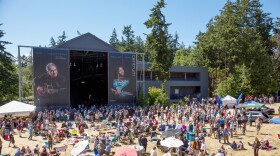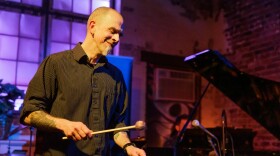In the summer of 1984, a shy 19-year-old aspiring jazz pianist from Nanaimo, BC, showed up for Centrum’s weeklong Jazz Port Townsend workshop. A few days later, a Centrum instructor heard her improvise on the keyboard, and recognized something special.
Before long, Diana Krall found herself playing and singing in Los Angeles, then Manhattan and Paris and beyond. Since then, she’s become one of the world’s best-known jazz musicians, with multiple Grammys, dozens of albums.
This month she was back in Port Townsend, this time on stage at the cavernous balloon hangar at Fort Worden, performing with some of the best jazz musicians on earth to help Centrum celebrate its 50th year promoting and inspiring young artists.
For half a century, this seemingly obscure nonprofit, operating out of an Army-fort-turned-state-park, has been hosting workshops and concerts focusing on all manner of music — from classical chamber quartets to country fiddling, from poetry to acoustic blues and much more.
To celebrate last week, gray-haired Port Townsenders filled that converted hangar, then migrated over to a fundraising dinner at the nearby Commons, where local supporters coughed up an astonishing $300,000 in contributions to its now well-established arts nonprofit.
A week earlier, the same building swung to country dance tunes bowed out by more than 300 fiddlers, some as young as 10, who converged on the park from around the nation. Next came country singers. Then poetry and creative writing, followed by acoustic blues.
These are the sounds of summer in Port Townsend, set to the rhythm of whatever Centrum artists are generating in the park.
Centrum was an idea dreamed up by local musicians, especially music professor Joe Wheeler, who was hired by the state to create an artistic mission at Fort Worden, the woodsy Army camp at the entrance to Puget Sound. The idea was to find a use for some 100 former military buildings, including barracks, officers’ homes, auditorium, chapel, and even that huge blimp hangar.
“It would be a place where master musicians and artists in many fields would gather with students of all ages and create together,” Centrum board president Scott Wilson told donors at the fundraising dinner. “In so doing they would also expand the global, hopeful power of creative inspiration.”
The site seemed ideal for artistic summer retreats – basic accommodations, studios, and performance venues all in a quiet, bucolic Northwest setting.
In the early years, the focus was on classical music and jazz. But every few years, Centrum added new workshops to its eclectic repertoire. Country fiddle tunes brought the sounds of the Ozarks to the Northwest woods. Then acoustic blues, a weeklong writers conference, a ukulele festival, vocal works with a deep country twang.
Ideas popped up organically, dreamed up by individuals with the right mix of experience and contacts — such as the local computer guy and mandolin player who convinced Centrum that it should create a weeklong festival of Brazilian music. A decade later, it still draws musicians for a week each spring.
At age 50, Centrum has become a $4 million-a-year operation with 14 fulltime staff. In a typical year, it brings in 300 temporary faculty, professional musicians and other artists from around the world who in turn lure more than 2,000 participants and thousands more visitors for the weekly summertime concerts and readings.
Less than a quarter of the income comes from student tuition and ticket sales, the rest from grants and private contributions. Locals, many of them affluent retirees drawn to Port Townsend in part by its Centrum-inspired arts climate, make up about 20% of its donations, plus most of the volunteers and concert audiences.
At 50, Centrum is in solid shape, says Rob Birman, executive director for the last 11 years. While programs were cancelled during the pandemic, they’re back this summer, he says. Enrollments increase steadily, the budget has been in the black with zero debt, and the endowment is nearing $1 million.
“I regret that I never met Joe Wheeler, but I’m awed by the incredible thing he envisioned,” Birman says.
Centrum’s unorthodox artistic mix and geography have their downsides. The historic buildings, many of them hastily built to house troops during WW II, are aging and inefficient, plagued by wood rot and leaky roofs.
And Centrum is strictly a tenant. “We don’t own anything at Fort Worden,” Birman says. At this point, the high heating and maintenance costs are borne by the state and by the Fort Worden Public Development Authority, the agency created to manage the site. This came to a head early in the pandemic, when Centrum closed down, leading to the near collapse of the PDA. More recently, Centrum has negotiated 25-year leases which provides some of the certainty it needs to raise money for costly upgrades.
Meanwhile, Centrum’s odd artistic mix lends itself to widely varying popular perceptions of the organization. Chamber music artists may have little interest in acoustic blues, and vice versa. There are hazards in trying to do too many things at once. “I managed symphonies for 25 years,” Birman explains. “People who support a symphony orchestra understand what is needed. But we don’t do just one thing.”
For Port Townsend enthusiasts, that range of offerings is Centrum’s greatest appeal. Stroll the grassy parade grounds on any summer afternoon, and one may hear the twang of Appalachian banjos, or Bach, or most recently the breathy contralto of a jazz singer who found her voice here four decades ago.
This article originally appeared on Post Alley, a Seattle-based writers' collective helping fill gaps in local journalism. Visit postalley.org to learn more and sign up for the weekly newsletter.






